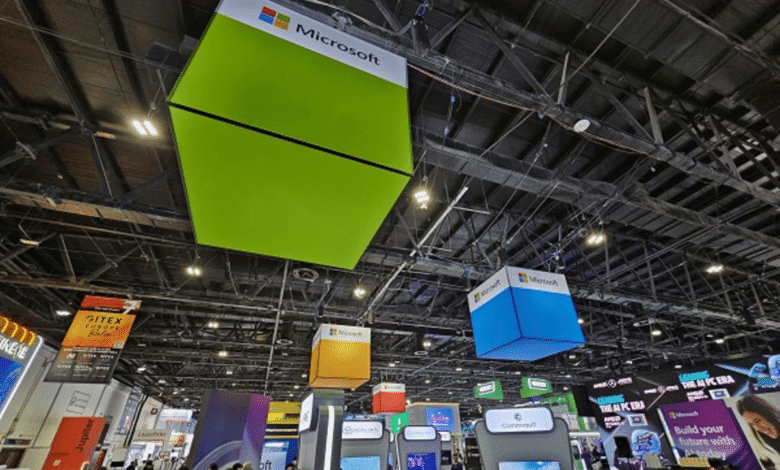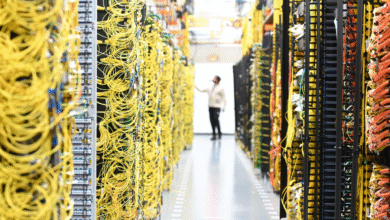OpenAI, G42, Microsoft Lead AI-Native Society Talks at GITEX 2025

▼ Summary
– GITEX GLOBAL 2025, held from October 13-17 at Dubai World Trade Centre, focuses on transitioning nations from fragmented AI adoption to cohesive nation-scale intelligence strategies.
– The event features a landmark virtual discussion between OpenAI CEO Sam Altman and G42 CEO Peng Xiao on advancing from early AI adoption to building AI-native societies.
– High-level dialogues involve ministers and policymakers from over 180 countries, addressing AI geopolitics, economic impacts, and strategies for leveraging AI to enhance national competitiveness.
– Investment discussions highlight a projected $375 billion in AI funding for 2025, exploring how capital is used as an instrument of technological power and geopolitical influence.
– Cybersecurity sessions address the growing threat of AI-enabled attacks, with experts outlining strategies to secure digital economies and public infrastructure.
The world stands at a critical juncture in artificial intelligence adoption, moving from isolated pilot projects toward comprehensive national strategies. GITEX GLOBAL 2025, scheduled for October 13-17 at Dubai World Trade Centre, represents the epicenter of this transformation, bringing together technology pioneers and policymakers to define the future of AI integration at societal levels. This gathering marks a pivotal moment where computational resources, data infrastructure, institutional preparedness, and governance frameworks converge to reshape economic and social systems worldwide.
A landmark virtual discussion will feature Sam Altman, CEO of OpenAI, making his inaugural appearance at the event alongside Peng Xiao, Group CEO of G42. Their session, titled “From Early Adoption to AI-Native Societies: Envisioning the Next Era of Intelligence,” brings together two influential figures shaping global AI development. The conversation promises groundbreaking perspectives on transitioning beyond experimental phases into full-scale implementation, establishing the foundational principles for societies built around artificial intelligence.
The G42 AI-Native Societies Programme extends these discussions into strategic partnerships and architectural frameworks. Senior representatives from Core42 and the US-UAE Business Council will examine the UAE-US 5GW AI Campus, recognized as the most substantial AI infrastructure initiative outside American borders. Additional insights into intelligence infrastructures and the visionary Global Intelligence Grid will come from leadership at G42, OpenAI, Microsoft, Cisco, Oracle, Khazna Data Centres, and Cerebras.
Practical implementation takes center stage with presentations from TAMM – Department of Government Enablement (Government of Abu Dhabi), Presight, Core42, OpenAI, Inception, AIQ, and Mohamed bin Zayed University of Artificial Intelligence. These sessions demonstrate how governmental bodies, industrial sectors, and educational institutions are deploying artificial intelligence at unprecedented scale.
Global AI Policy and Economic Influence
GITEX GLOBAL 2025’s conference program assembles an impressive roster of government ministers, policy architects, technology executives, entrepreneurs, and investment professionals from more than 180 countries. Discussions span multiple summits addressing AI geopolitics and sovereignty, quantum computing advancements, cross-industry applications, investment strategies, and cybersecurity resilience in an AI-dominated era.
Supported by an exhibition floor hosting over 6,800 technology companies, 2,000 emerging startups, 40+ unicorn enterprises, and 1,200 investors managing $1.1 trillion in assets, the dialogues occurring on stage carry profound implications for future strategic directions, business transformations, collaborative ventures, and economic forces redefining the technology sector.
Ekaterina Zaharieva, European Commissioner for Startups, Research and Innovation, will initiate discussions about Europe’s initiative to convert deep-technology expertise into strategic economic advantage. Meanwhile, H.E. Abdulla Bin Touq Al Marri, UAE Minister of Economy and Tourism, will address economic strategy recalibrations around artificial intelligence.
High-level dialogues continue with H.E. Omar Sultan Al Olama, UAE Minister of State for Artificial Intelligence, Digital Economy and Remote Work Applications, alongside Hon. Evan Solomon, Canada’s inaugural Minister of Artificial Intelligence and Digital Innovation. Their joint examination of the “intelligence super-cycle” explores how nations utilize AI to mitigate economic instability while establishing digital leadership positions.
Directing Capital for National Advancement
With UBS projecting a remarkable $375 billion in AI project funding for 2025, significant questions emerge regarding the geopolitical implications of these investments. A crucial session features Victor Gao, Chairman of The China Energy Security Institute, engaging with Dr. Jörg Goschin, CEO of Germany’s KfW Capital, Europe’s largest state-supported venture capital firm deploying €2.5 billion. Their exchange addresses the new geoeconomics of investment, examining how capital increasingly functions as an instrument of technological influence.
On national investment strategies, Naima Al Falasi, Senior Vice President for AI Strategy & Transformation at Mubadala, Abu Dhabi’s sovereign wealth fund overseeing a $302 billion portfolio, shares strategic perspectives on integrating AI and machine learning across vital sectors to enhance national competitive advantage.
Corporate Technology Frameworks – Industrial AI to Semiconductor Strategies
According to McKinsey research, 92 percent of corporations are accelerating AI expenditures in 2025, intensifying pressure to demonstrate concrete business value. Peter Koerte, Chief Technology and Strategy Officer at Siemens, provides practical guidance for transforming the complexities of industrial AI into competitive business benefits. Zulfi Alam, Corporate Vice President for Quantum at Microsoft, shifts focus to human capital development, outlining necessary collaborations between corporations, academic institutions, and governments to cultivate a workforce prepared for quantum computing.
Representing hardware development, Qualcomm’s President and Senior Vice President for Government Affairs EMEA, Wassim Chourbaji, offers fresh viewpoints on achieving macroeconomic prosperity through coordinated semiconductor and AI strategies. As IBM expands quantum and AI infrastructure across more than 100 countries, Ana Paula Assis, Senior Vice President, Chair and General Manager for EMEA & Growth Markets at IBM, provides a multifaceted preview of business operations and governance structures in the emerging quantum-AI era.
Innovative Companies Reshaping Computation, Energy and Neural Networks
Visionary founders present sophisticated perspectives on AI’s future economic implications. Andrew Feldman, CEO of Cerebras, shares successful scaling strategies from startup through initial public offering, while Greg Jackson, CEO of Octopus Energy, a $10 billion AI unicorn, challenges attendees with the energy-AI paradox – questioning whether current infrastructure expansion rates remain sustainable.
Ramin Hasani, CEO of Liquid AI, introduces liquid neural networks, a revolutionary approach inspired by microscopic worm neurology that enables more adaptive and efficient AI systems. Throughout these exchanges, recurring themes include speed versus sustainability, scalability versus flexibility, and established versus emerging technological paradigms.
Emerging Cybersecurity Challenges in AI Evolution
The World Economic Forum’s Global Cybersecurity Outlook 2025 indicates that generative AI is increasingly weaponized by malicious actors for sophisticated phishing campaigns and malicious code development, with weekly attack frequencies surging 58 percent over two years.
H.E. Dr. Mohamed Al-Kuwaiti, Head of Cybersecurity for the UAE Government, outlines AI’s function in safeguarding public service infrastructure and the nation’s methodology for securing a $500 billion digital economy with 99 percent connectivity. H.E. Liisa-Ly Pakosta, Estonia’s Minister of Justice and Digital Affairs and custodian of the nation’s digital strategy, analyzes governmental responses to AI-enabled security threats.
Expanding Latin America’s participation in global cybersecurity discourse, André Molina, Secretary of Cybersecurity and Information Security at the Institutional Security Office of the Presidency of Brazil, emphasizes AI’s potential for strengthening public services and reinforcing cyber defenses from critical infrastructure to digital identity systems.
(Source: Economy Middle East)



